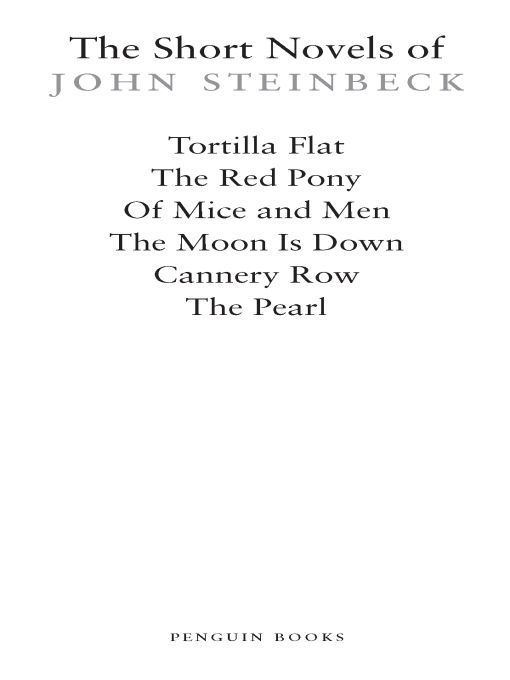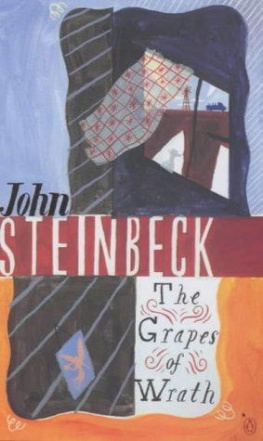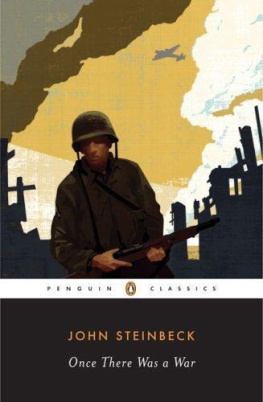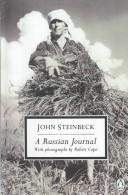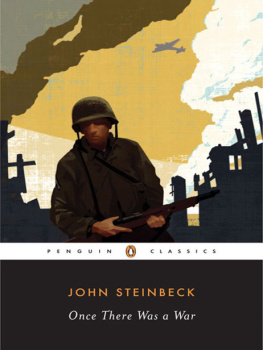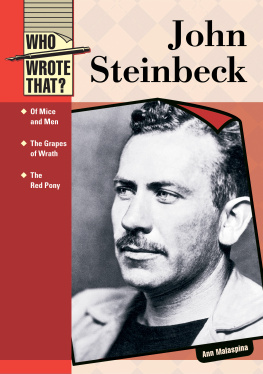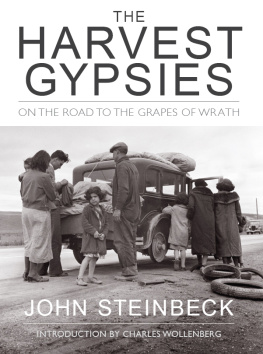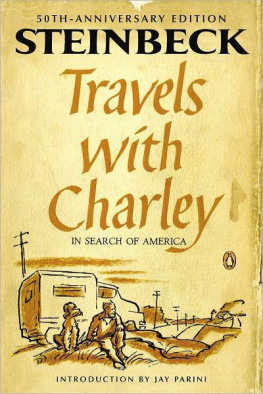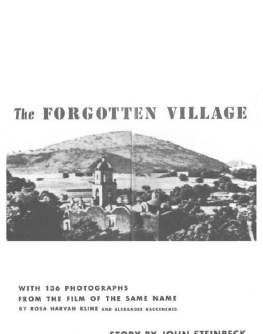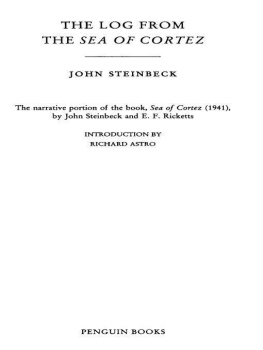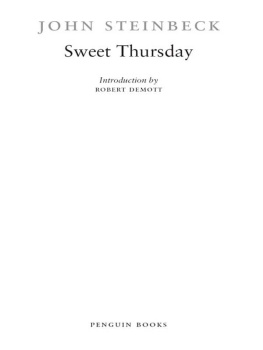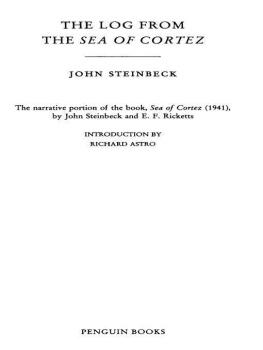Table of Contents
THE SHORT NOVELS OF JOHN STEINBECK
Born in Salinas, California, in 1902, JOHN STEINBECK grew up in a fertile agriculture valley about twenty-five miles from the Pacific Coastand both valley and coast would serve as settings for some of his best fiction. In 1919 he went to Stanford University, where he intermittently enrolled in literature and writing courses until he left in 1925 without taking a degree. During the next five years he supported himself as a laborer and journalist in New York City and then as a caretaker for a Lake Tahoe estate, all the time working on his first novel, Cup of Gold (1929). After marriage and a move to Pacific Grove, he published two California fictions, The Pastures of Heaven (1932) and To a God Unknown (1933), and worked on short stories later collected in The Long Valley (1938). Popular success and financial security came only with Tortilla Flat (1935), stories about Montereys paisanos. A ceaseless experimenter throughout his career, Steinbeck changed courses regularly. Three powerful novels of the late 1930s focused on the California laboring class: In Dubious Battle (1936), Of Mice and Men (1937), and the book considered by many his finest, The Grapes of Wrath (1939). Early in the 1940S, Steinbeck became a filmmaker with The Forgotten Village (1941) and a serious student of marine biology with Sea of Cortez (1941). He devoted his services to the war, writing Bombs Away (1942) and the controversial play-novelette The Moon Is Down (1942). Cannery Row (1945), The Wayward Bus (1947), The Pearl (1947), A Russian Journal (1948), another experimental drama, Burning Bright (1950), and The Log from the Sea of Cortez (1951) preceded publication of the monumental East of Eden (1952), an ambitious saga of the Salinas Valley and his familys history. The last decades of his life were spent in New York City and Sag Harbor with his third wife, with whom he traveled widely. Later books included Sweet Thursday (1954), The Short Reign of Pippin IV: A Fabrication (1957), Once There Was a War (1958), The Winter of Our Discontent (1961), Travels with Charley in Search of America (1962), America and Americans (1966), and the posthumously published Journal of a Novel: The East of Eden Letters (1969), Viva Zapata! (1975), The Acts of King Arthur and His Noble Knights (1976), and Working Days: The Journals of The Grapes of Wrath (1989). He died in 1968, having won a Nobel Prize in 1962.
BY JOHN STEINBECK
FICTION
Cup of GoldCup of Gold
The Pastures of Heaven
To a God Unknown
Tortilla Flat
In Dubious Battle
Saint Katy the Virgin
Of Mice and Men
The Red Pony
The Long Valley
The Moon Is Down
Cannery Row
The Wayward Bus
The Pearl
Burning Bright
East of Eden
Sweet Thursday
The Winter of Our Discontent
The Short Reign of Pippin IV
The Grapes of Wrath
Las uvas de la ira (Spanish-language edition of The Grapes of Wrath)
The Acts of King Arthur and His Noble Knights
NONFICTION
Sea of Cortez: A Leisurely Journal of Travel and Research
(in collaboration with Edward F. Ricketts)
Bombs Away: The Story of a Bomber Team
A Russian Journal (with pictures by Robert Capa)
The Log from the Sea of Cortez
Once There Was a War
Travels with Charley in Search of America
America and Americans
Journal of a Novel: The East of Eden Letters
Working Days: The Journals of The Grapes of Wrath
PLAYS
Of Mice and Men
The Moon Is Down
COLLECTIONS
The Portable Steinbeck
The Short Novels of John Steinbeck
Steinbeck: A Life in Letters
OTHER WORKS
The Forgotten Village (documentary)
Zapata (includes the screenplay of Viva Zapata!)
CRITICAL LIBRARY EDITION
The Grapes of Wrath (edited by Peter Lisca)
TORTILLA FLAT
To
SUSAN GREGORY
of Monterey
Preface
This is the story of Danny and of Dannys friends and of Dannys house. It is a story of how these three became one thing, so that in Tortilla Flat if you speak of Dannys house you do not mean a structure of wood flaked with old whitewash, overgrown with an ancient untrimmed rose of Castile. No, when you speak of Dannys house you are understood to mean a unit of which the parts are men, from which came sweetness and joy, philanthropy and, in the end, a mystic sorrow. For Dannys house was not unlike the Round Table, and Dannys friends were not unlike the knights of it. And this is the story of how that group came into being, of how it flourished and grew to be an organization beautiful and wise. This story deals with the adventuring of Dannys friends, with the good they did, with their thoughts and their endeavors. In the end, this story tells how the talisman was lost and how the group disintegrated.
In Monterey, that old city on the coast of California, these things are well known, and they are repeated and sometimes elaborated. It is well that this cycle be put down on paper so that in a future time scholars, hearing the legends, may not say as they say of Arthur and of Roland and of Robin HoodThere was no Danny nor any group of Dannys friends, nor any house. Danny is a nature god and his friends primitive symbols of the wind, the sky, the sun. This history is designed now and ever to keep the sneers from the lips of sour scholars.
Monterey sits on the slope of a hill, with a blue bay below it and with a forest of tall dark pine trees at its back. The lower parts of the town are inhabited by Americans, Italians, catchers and canners of fish. But on the hill where the forest and the town intermingle, where the streets are innocent of asphalt and the corners free of street lights, the old inhabitants of Monterey are embattled as the Ancient Britons are embattled in Wales. These are the paisanos.
They live in old wooden houses set in weedy yards, and the pine trees from the forest are about the houses. The paisanos are clean of commercialism, free of the complicated systems of American business, and, having nothing that can be stolen, exploited, or mortgaged, that system has not attacked them very vigorously.
What is a paisano? He is a mixture of Spanish, Indian, Mexican, and assorted Caucasian bloods. His ancestors have lived in California for a hundred or two years. He speaks English with a paisano accent and Spanish with a paisano accent. When questioned concerning his race, he indignantly claims pure Spanish blood and rolls up his sleeve to show that the soft inside of his arm is nearly white. His color, like that of a well-browned meerschaum pipe, he ascribes to sunburn. He is a paisano, and he lives in the uphill district above the town of Monterey called Tortilla Flat, although it isnt a flat at all.
Danny was a paisano, and he grew up in Tortilla Flat and everyone liked him, but he did not stand out particularly from the screeching children of Tortilla Flat. He was related to nearly everyone in the Flat by blood or romance. His grandfather was an important man who owned two small houses in Tortilla Flat and was respected for his wealth. If the growing Danny preferred to sleep in the forest, to work on ranches, and to wrest his food and wine from an unwilling world, it was not because he did not have influential relatives. Danny was small and dark and intent. At twenty-five his legs were bent to the exact curves of a horses sides.

